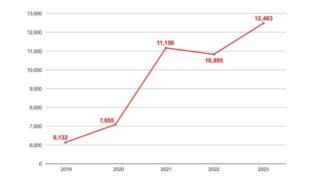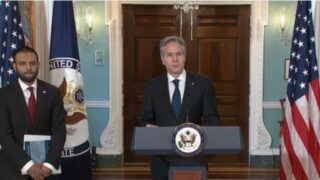Using propaganda and monetary rewards, police and teachers join forces to make schoolchildren report on people of faith.
by Shen Xinran
Inciting citizens to report on each other has been one of the CCP’s go-to tools to suppress dissent ever since the Cultural Revolution when people betrayed even their families and friends to prove loyalty to the state. The current regime uses this despicable method to crack down on religion.
In April 2019, a primary school principal in Hohhot, the capital of Inner Mongolia, gathered the school’s students for a lecture on the importance of reporting on religious believers. He first played a video in which a teacher was telling students to observe if their families or neighbors receive visitors who could be religious. After a student in the video revealed to the group that his neighbor had hosted a gathering of believers, the teacher reported the fact to the police. Subsequently, the neighbor was arrested, together with a group of visiting believers.
After watching the video, the school’s assistant principal encouraged the students to follow the boy’s example and report to the police religious family members and neighbors. He also threatened to expel from school anyone who believes in God. The children were asked to fill out a form about the religious status of their family members, indicating if strangers often visit their homes, what families do in their free time, and other similar facts about their daily lives.
“My child told me that in the video, students were told that those who don’t go to the government-approved places of worship believe in a xie jiao, and they should be reported to the police at once,” a Christian parent of one of the students said angrily. “By doing so, the government is misleading our children. They are so young and ignorant. My child was frightened after watching this video, but he promised not to report me to his teacher.”
The investigation form distributed to the students of a middle school in the same area was even more detailed. Apart from the basic information on the students’ parents, the form requires to indicate the religious denomination their parents belong to, venues where they gather, how religious materials are distributed, and similar information.
In March last year, after the administration of a primary school in Heihe city in the northeastern province of Heilongjiang learned that parents of more than ten students were religious, they told the children to write statements of self-criticism. The pledges “not to believe in religion or preach the gospel in the future” were required to be signed by their parents. Those who refused to do so would not be able to run for class leaders, the students were warned. The school required all religious students to give up their faith and be loyal to the Communist Party, emphasizing that the government has provided them with everything they have.
Last October, in a primary school in Xinhua county in the central province of Hunan, a police officer showed students a pile of 100 RMB bills and more than 20 travel coupons to Malaysia, trying to induce them to disclose the religious status of their parents and relatives. Those who did were rewarded with 100 RMB (about $ 14) and a travel coupon. The next day, the principal threatened students in the school that anyone who believes in God would be expelled.
Before that, the police went to a middle school in the county to question students there if any of their family members believed in God. Those who reported their religious family members received 160 RMB (about $ 23) as a reward and were allowed to play on their cellphones or computers in school.
According to a member of The Church of Almighty God (CAG) from a county in the southeastern province of Jiangxi, police officers distributed anti-religious leaflets at her grandson’s primary school in the fall of last year, demanding the students to report their family members who are members of the CAG. If not, they were threatened to be barred from school. Since then, the boy started pressuring his grandmother to give up her faith.










